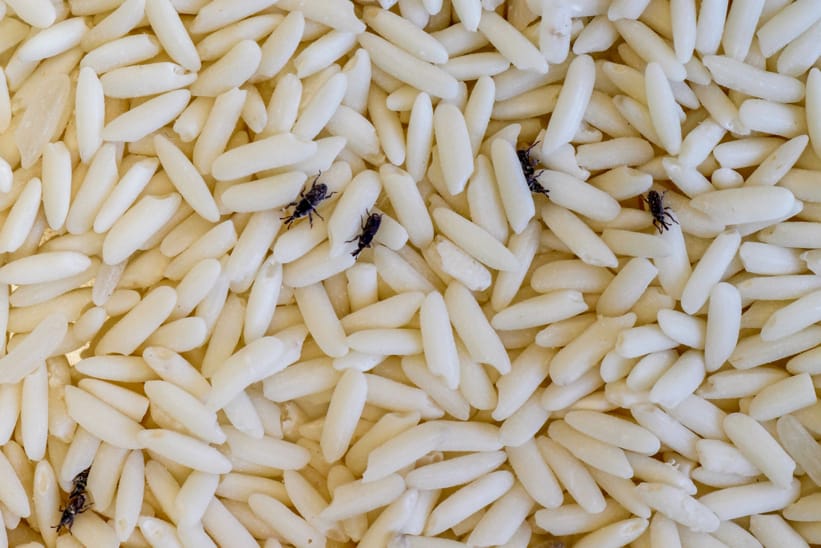
Contents
Got bugs? That’s a big problem, especially if you find them in your pantry or other food storage areas. If you spot little black bugs in your pantry, you may wonder what bugs they are and how to get rid of them.
There are a few different types of pests that could live in your pantry that fit the description of “little black bugs,” including cigarette beetles, drugstore beetles, rice weevils, and Indian meal moths. These pantry pests love to feed on common grocery items, like dried fruits and veggies, cereals, candy, nuts, sugar, flour, and other grains.
No matter how they got there – usually through packaged goods, as eggs can hide in flours and sugars waiting to hatch – it’s important to get rid of them. These types of pests can contaminate your food and hatch more eggs, causing even more of a problem.
Here are some ways to get rid of these little black bugs in your pantry and keep them out for good.
Store flour and sugar in the freezer until you are ready to use them
If there are eggs hiding in your flour or sugar, it’s best to kill them before they get the chance to hatch. When shopping in the store, check bags for openings or small holes. These can be easy entries for hitchhiking pests, and you do not what to bring any home.
When you bring it home from the store, immediately put the package in the freezer for at least 48 hours to kill insect eggs that might be lurking. The cold temps will not affect the product’s quality. Once you are ready to use it, transfer the flour or sugar out of the store packaging and into a food-safe, air-tight container with a tight lid.
Check for gaps and cracks in your home
These little black bugs can also find their way into your home pantry through other means. Cracks in your walls, unsealed doors, and other openings in your home can attract pests that thrive in your food storage areas.
To keep pantry pests at bay, ensure that your home is secure. Repair any cracks or gaps around the outside of the home, inspect your home’s structure yearly, and keep entries like doors and windows closed when not in use, especially in the winter. Also, double-check that all doors and windows have proper seals. Check that other points in the home are protected such as the dryer vents, attic vents, and the chimney.
Regularly clean inside your pantry and all over your home
The biggest thing that will keep these pests out of your home is keeping it clean as best as you can. Bugs, pests, and even rodents gravitate towards messy areas, especially when that mess involves food. Keeping your home clean is the best and most manageable way to keep all pests out of your home.
Always ensure that your pantries are clean and dry. Regularly throw out old and expired food and vacuum all over the house, especially areas like the kitchen where crumbs and other food debris can fall. Also, always avoid clutter, as bugs and pests thrive in dark, cluttered, and small spaces.
When in doubt, call pest control
Sometimes you can do everything in your power to prevent little black bugs and other pests from getting into your home and they still find a way. When that happens, it’s important to call an exterminator or pest control. You do not want to give insects time to populate, as the more that there are, the danger to your family’s health increases.
Van Den Berge Pest Control has been voted the best of West Michigan Pest Control companies for eight consecutive years and offers a 100% no-risk guarantee for pests of all kinds, whether it’s those little black bugs in your pantry or other pests. Contact us today at 616-392-7367 if you need help identifying or eliminating pests from your home.
Recent Posts
Why Use Effective Earwig Removal Techniques at Home?
Earwigs may seem harmless, but they can wreak havoc on your garden and even invade
5 Effective Spider Control Tips for Homeowners
If you’re looking to keep these eight-legged visitors at bay, there are effective spider control
How to Effectively Control Spiders in Your Home
Controlling spiders in your home requires an understanding of their behavior and environmental preferences. By
